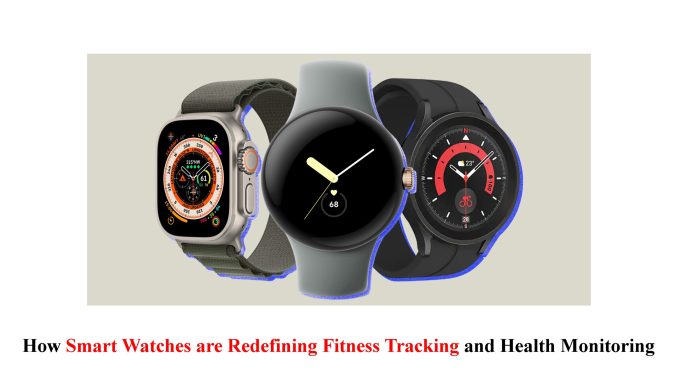
Introduction to Smart Watches and their Features
Welcome to the era of smartwatches – where timekeeping is just the tip of the iceberg! These sleek and innovative gadgets have taken the world by storm, revolutionizing not only how we stay connected but also how we monitor our fitness and health. Gone are the days when a watch was simply a fashion accessory or a tool for telling time; now, it’s your trainer, health companion, and more!
With its array of impressive features and capabilities, smartwatches have truly redefined what it means to track our fitness goals and monitor our overall well-being. From counting steps to analyzing sleep patterns, these nifty devices seamlessly integrate technology into every aspect of our lives.
But how did we get here? How did fitness tracking evolve from basic pedometers to sophisticated wrist-worn companions? And what exactly does this mean for our health journey? Join us as we dive deep into the world of smartwatches and explore how they are reshaping the way we prioritize and manage our physical well-being.
So grab your favorite wearable device – whether it’s an Apple Watch, Fitbit Versa, or Samsung Galaxy Watch – as we embark on this exciting exploration together. Get ready to unleash your inner tech enthusiast while discovering all that smartwatches have in store for you on your path toward optimal health!
The Evolution of Fitness Tracking Technology
Fitness-tracking technology has come a long way in recent years, and smartwatches have played a pivotal role in this evolution. Gone are the days of bulky pedometers and basic step counters. Today’s fitness trackers are sleek, stylish, and packed with advanced features that can help you reach your health and wellness goals.
One significant development in fitness-tracking technology is the integration of heart rate monitoring. Smartwatches now come equipped with optical sensors that can accurately measure your heart rate throughout the day, providing valuable insights into your overall cardiovascular health. This feature allows users to track their heart rate during workouts, ensuring they stay within their target heart rate zones for optimal training.
Another innovation is sleep tracking functionality. Sleep plays a critical role in our overall well-being, and many people struggle to get enough quality rest each night. With smartwatches, individuals can now monitor their sleep patterns and gain insights into how well they are sleeping each night. This data can be used to make necessary adjustments to improve sleep quality and ultimately enhance overall health.
Furthermore, modern fitness trackers offer GPS capabilities that allow users to accurately track distances covered during outdoor activities such as running or cycling. By mapping out routes and calculating pace, these devices provide detailed statistics on performance metrics that help athletes set new personal records or achieve specific training goals.
The Integration of Health Monitoring in Smart Watches
Smartwatches have truly revolutionized the way we approach fitness and health monitoring. These sleek devices are not just stylish accessories for our wrists; they are packed with advanced technology that can track and monitor various aspects of our well-being.
One of the key features of smartwatches is their integration of health monitoring capabilities. Gone are the days when you had to rely on bulky fitness trackers or visit a medical professional to keep tabs on your vital signs. Smartwatches now offer an array of sensors that can measure heart rate, blood pressure, sleep patterns, and even oxygen levels in real-time.
With this wealth of data at your fingertips, you can gain valuable insights into your overall health and make informed decisions about your lifestyle choices. For example, if you notice that your heart rate spikes during stressful moments throughout the day, it might be an indication that you need to incorporate more relaxation techniques into your routine.
Moreover, smartwatches can also provide personalized feedback and guidance based on this collected data. Many models come equipped with built-in coaching programs or connect seamlessly with dedicated apps that offer workout suggestions tailored to your specific goals and abilities.
By integrating health monitoring features into smartwatches, manufacturers have created powerful tools for individuals who want to take charge of their well-being. Whether you’re looking to lose weight, improve cardiovascular fitness or simply stay active throughout the day, these devices can serve as constant reminders and motivators to help achieve those goals.
In addition to tracking physical activity metrics like steps taken and calories burned, some smart watches also offer stress management features such as guided breathing exercises or meditation prompts. This holistic approach acknowledges the importance of mental health in overall wellness.
The integration of health monitoring in smartwatches has opened up new possibilities for proactive healthcare management. Imagine being alerted by your device if it detects irregularities in your heart rhythm or a sudden drop in oxygen saturation levels while sleeping – potentially life-saving information at hand!
Benefits of Using a Smart Watch for Fitness and Health
One of the major benefits of using a smartwatch for fitness and health is the convenience it offers. With a smartwatch strapped to your wrist, you can easily track your daily physical activities without the need to carry around a separate device. Whether you’re going for a run, cycling, or hitting the gym, your smart watch can provide real-time data on distance covered, calories burned, heart rate, and more.
Another advantage is that smartwatches often come with built-in GPS functionality. This means that you can accurately map out your routes during outdoor activities like running or cycling. Not only does this help you keep track of your progress, but it also ensures that you stay safe by knowing where you are at all times.
Smartwatches also offer features such as sleep tracking and stress monitoring. These functions allow users to gain insights into their sleeping patterns and overall well-being. By analyzing data collected over time, individuals can make informed decisions about their lifestyle choices that may impact their quality of sleep and stress levels.
Furthermore, many smartwatches have integrated app platforms where users can access various health-related applications. These apps provide additional functionalities like personalized workout plans and nutrition tracking. They enable users to set goals for themselves and receive reminders or notifications to keep them motivated on their fitness journey.
In addition to these benefits, some smartwatches offer water resistance capabilities which make them suitable for swimming or other water-based activities. This allows swimmers to accurately measure metrics such as stroke count and lap times to improve performance.
Using a smartwatch for fitness and health brings together essential tools right on your wrist – making it easier than ever before to monitor key aspects of personal wellness throughout the day!
Comparison of Popular SmartWatch Brands
When it comes to choosing a smartwatch, several popular brands offer a range of features and functionalities. Let’s take a closer look at some of the top contenders in the market.
Apple Watch: Known for its sleek design and seamless integration with other Apple devices, the Apple Watch offers an impressive array of health and fitness tracking features. With built-in GPS, heart rate monitoring, and activity tracking, it is well-suited for those looking to track their workouts and overall wellness.
Samsung Galaxy Watch: The Samsung Galaxy Watch stands out with its rotating bezel control feature, allowing for easy navigation through menus and apps. It also boasts advanced health-tracking capabilities such as sleep analysis and stress management. With its robust ecosystem of compatible apps, this smartwatch caters to both fitness enthusiasts and tech-savvy individuals.
Fitbit Versa: Fitbit has made a name for itself in the fitness tracking industry, and the Fitbit Versa continues to impress with its comprehensive health monitoring capabilities. Equipped with heart rate monitoring, sleep tracking, guided breathing exercises, personalized coaching programs, and more, it provides users with valuable insights into their overall well-being.
Garmin Forerunner: Designed specifically for athletes and outdoor enthusiasts, the Garmin Forerunner series focuses on delivering accurate GPS tracking, sophisticated training metrics, and performance analysis.
These watches excel at providing detailed data on running, cycling, and swimming activities, making them ideal companions for serious athletes.
These are just a few examples of popular smartwatch brands available today.
Other notable options like Huawei, Sony, and TicWatch deserve attention as well.
With each brand offering unique features, buyers can choose based on their specific requirements.
Whether you prioritize style, functionality, or compatibility, you’re sure to find a smartwatch that suits your needs.
Happy shopping!
Future Developments and Innovations in Smart Watch Technology
As technology continues to advance at a rapid pace, it’s no surprise that smartwatches are also undergoing constant improvements. These wearable devices have already come a long way since their inception, but the future holds even more exciting possibilities.
One area of focus for future smartwatch developments is battery life. Many users find themselves charging their smartwatches frequently, which can be inconvenient. However, manufacturers are working on innovative ways to improve battery efficiency and longevity. Imagine a smartwatch that can last for weeks or even months without needing a recharge!
Another aspect being explored is enhanced health monitoring capabilities. While current models offer features like heart rate monitoring and step counting, there is room for improvement and expansion in this area. Future smartwatches may be able to track more advanced metrics such as blood pressure, oxygen saturation levels, and sleep quality with greater accuracy.
Additionally, there is potential for integration with other devices and technologies such as virtual reality (VR) headsets or augmented reality (AR) glasses. This would open up new possibilities for immersive fitness experiences or interactive health coaching right from your wrist.
Furthermore, advancements in sensor technology could lead to smarter contextual awareness in smartwatches. For example, sensors could detect when you’re stressed based on changes in skin conductance or monitor your body temperature fluctuations throughout the day to provide personalized recommendations for managing stress levels.
We may see improved user interfaces that make interacting with smartwatches even easier and more intuitive. This could involve innovations such as voice recognition systems becoming more accurate and responsive or gesture-based controls allowing users to navigate through menus effortlessly.
Conclusion: The Impact of Smart Watches on Personal Health and Wellness
Smartwatches have revolutionized the way we approach fitness tracking and health monitoring. With their advanced features and seamless integration with our daily lives, these wearable devices have become indispensable tools for individuals looking to take charge of their well-being.
The evolution of fitness-tracking technology has paved the way for smartwatches to become comprehensive health companions. From step counting to heart rate monitoring, and sleep tracking to calorie calculation, these devices offer a wealth of data that can help users understand their habits and make informed decisions about their lifestyle choices.
The integration of health monitoring in smartwatches has further enhanced their value. By incorporating sensors and algorithms that can detect abnormalities in heart rhythm or blood oxygen levels, these devices have the potential to alert us to potential health issues before they escalate. This proactive approach empowers individuals to be more proactive in managing their health.
One of the key benefits of using a smartwatch for fitness and health is its convenience. These compact devices can be worn all day long without getting in the way or causing discomfort. They seamlessly sync with our smartphones, allowing us to track progress, set goals, and receive real-time updates on our physical activity levels. Additionally, many smartwatches now come equipped with GPS functionality, making them perfect companions for outdoor enthusiasts who want accurate distance measurements during runs or hikes.
When it comes to choosing a smartwatch brand that suits your needs, there are several popular options available on the market today. Whether you prefer Apple’s sleek design and innovative features or Samsung’s wide range of customization options, there is undoubtedly a device out there that will cater to your preferences.
Looking ahead into the future developments in this field show promise for even more exciting innovations in smartwatch technology. We can expect advancements such as improved battery life, better accuracy in sensor readings, enhanced connectivity options including 5G capabilities as well as new integrations with healthcare providers’ systems for seamless data sharing.



Leave a Reply